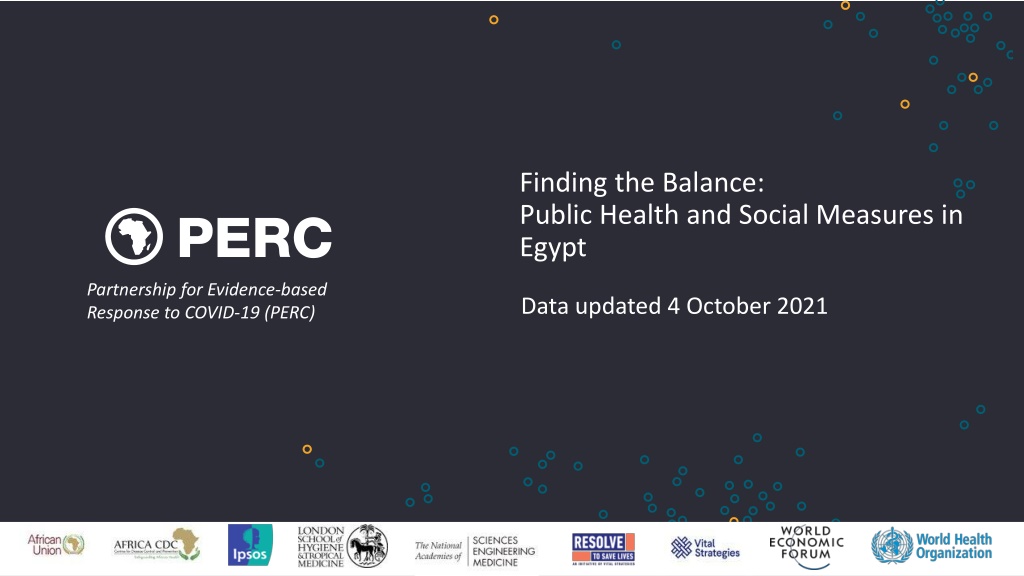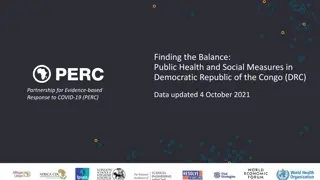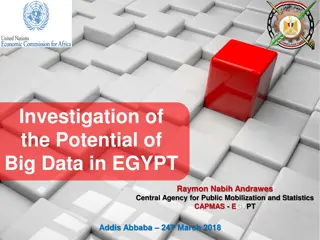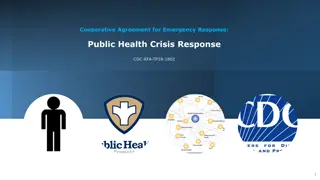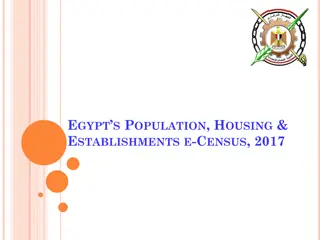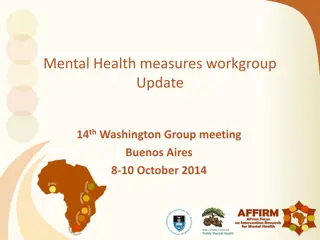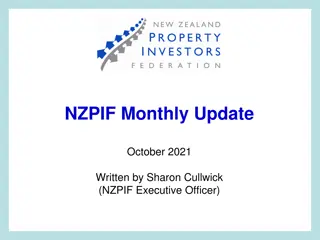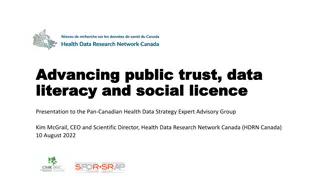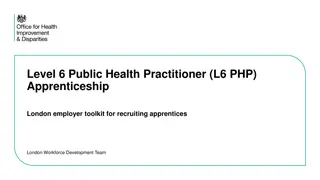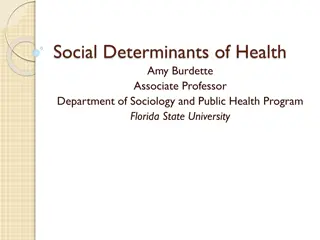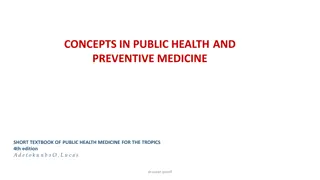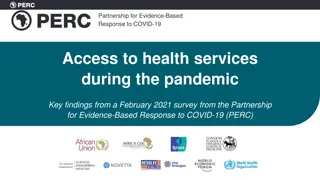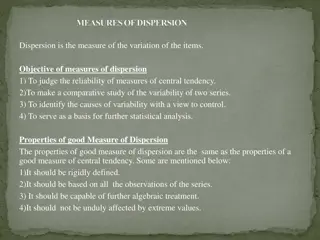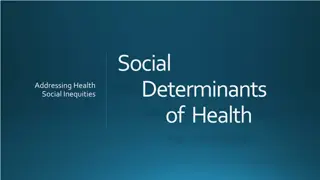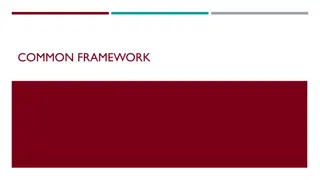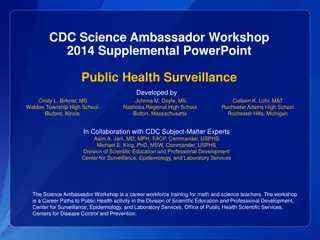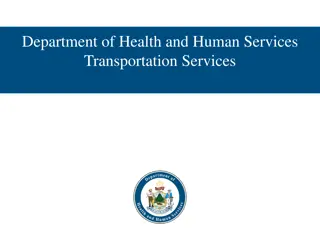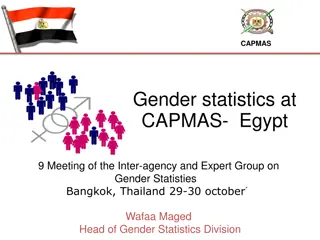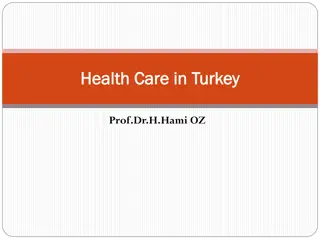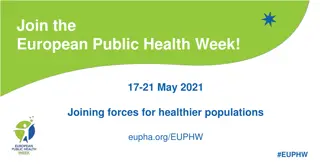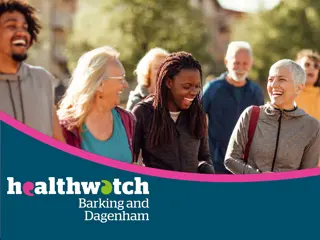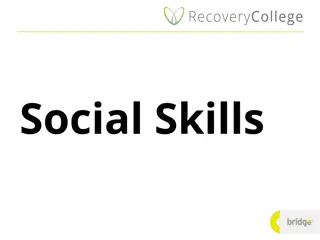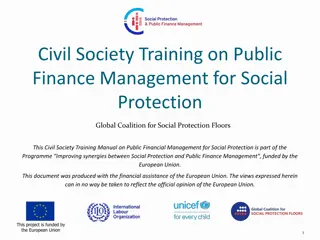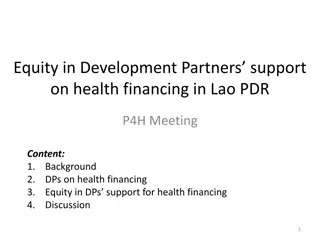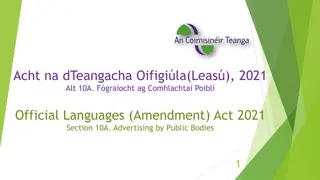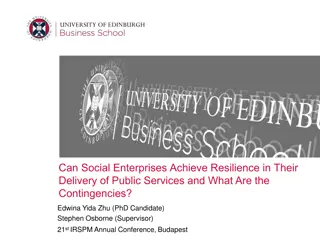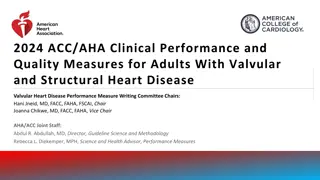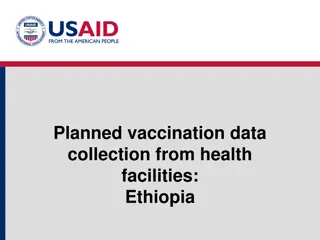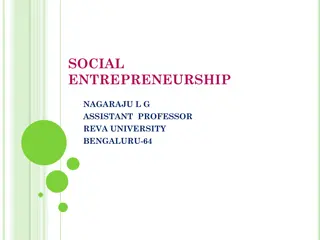Public Health and Social Measures in Egypt: PERC Data Update October 2021
The Partnership for Evidence-Based Response to COVID-19 (PERC) in Egypt collects data on social, economic, epidemiological, and population movement to assess the effectiveness of public health measures. Survey findings from September 2021 show high support for measures, though adherence has decreased. Concerns about COVID-19 remain high, with vaccination rates relatively good. Income loss and food access issues are prevalent, highlighting ongoing challenges.
Download Presentation

Please find below an Image/Link to download the presentation.
The content on the website is provided AS IS for your information and personal use only. It may not be sold, licensed, or shared on other websites without obtaining consent from the author. Download presentation by click this link. If you encounter any issues during the download, it is possible that the publisher has removed the file from their server.
E N D
Presentation Transcript
Finding the Balance: Public Health and Social Measures in Egypt Partnership for Evidence-based Response to COVID-19 (PERC) Data updated 4 October 2021
PERC Overview The Partnership for Evidence-Based Response to COVID-19 (PERC) is a public-private partnership that supports evidence-based measures to reduce the impact of COVID-19 on African Union Member States. PERC collects social, economic, epidemiological, population movement, and security data from 19 African Union Member States to help determine the acceptability, impact and effectiveness of public health and social measures for COVID-19. This report describes findings from a telephone survey with 1,262 people conducted in September 2021, alongside local epidemiological and secondary data. This is the fourth report from the PERC since the pandemic began.
Table of Contents I. Highlights II. Disease Dynamics and PHSM Implementation III. PSHM Support and Self-Reported Adherence IV. Risk Perceptions and Information V. Vaccine Beliefs and Uptake VI. Secondary Burdens
Highlights and Trend Analysis Ipsos / Resolve to Save Lives : South Africa Partnership for Evidence-based Response to COVID-19
Highlights Following the relaxation of most PHSMs in June and July 2021 and large summer gatherings, reported COVID-19 incidence has increased continually since early August. Support for PHSMs remained higher in Egypt than in other surveyed African Union (AU) Member States in the Northern region, but self-reported adherence had declined since February 2021, likely due to the relaxation of restrictions. Perceived risk of infection remained higher than the Northern regional average and COVID-19 was the most commonly reported concern among survey respondents. However, stigmatization of health care workers was common: seven in 10 respondents believed that health care workers should be avoided because of COVID-19. Eight in 10 survey respondents were either vaccinated or likely to get vaccinated. Among those who reported being unlikely to get vaccinated, low risk perception was the most commonly reported reason. Among households who needed health care, about one-fourth reported skipping or delaying care in the previous six months, most commonly because of concerns about catching COVID-19. Seven in 10 respondents reported having lost income since the start of the pandemic and three in 10 reported missing meals in the previous seven days. Higher prices and income loss were the most common barriers to food access.
Survey Trend Highlights Survey 2 Survey 4 Survey 3 Note: Survey 1 conducted in May 2020 is not comparable to the other three surveys because it was fielded only among urban populations, results are therefore not shown here.
Disease Dynamics and PHSM implementation Ipsos / Resolve to Save Lives : South Africa Partnership for Evidence-based Response to COVID-19
Situational Awareness After widespread relaxation of public health and social measures in June and July 2021, reported new cases have been on the rise since August 2021.
PHSM Support and Self-Reported Adherence Ipsos / Resolve to Save Lives : South Africa Partnership for Evidence-based Response to COVID-19
Individual measures Do people support and follow measures? Self-reported adherence to all PHSMs declined since the February 2021 survey, likely because few PHSMs were in place in Egypt by September 2021. However, support for individual measures remained high and support for restrictions on social gatherings and movement were above Northern regional averages (59% vs. 43% and 69% vs. 41%, respectively). Social measures Data Breakdown: Self-reported adherence to all PHSMs was about 10-15 percentage points higher among those with high perceptions of risk, compared to those with low risk perception. Support for and reported adherence to avoiding social gatherings were slightly lower among urban than rural respondents (56% vs. 61% and 33% vs. 39%, respectively). Economic measures Ipsos / Resolve to Save Lives : South Africa Partnership for Evidence-based Response to COVID-19 Partnership for Evidence-based Response to COVID-19 September 2021
Risk Perception and Information Ipsos / Resolve to Save Lives : South Africa Partnership for Evidence-based Response to COVID-19
How do people understand risk? Perceived personal risk of COVID-19 infection remained higher in Egypt than in other surveyed Member States in the Northern region, consistent with findings from the August 2020 and February 2021 surveys. Data Breakdown: The share of respondents who believed they were at high or very high risk of infection was similar to the February 2021 survey (31% vs. 35%); both surveys were conducted midway through a surge in cases, which may have contributed to higher perceived risk of infection. Ipsos / Resolve to Save Lives : South Africa Partnership for Evidence-based Response to COVID-19 September 2021
How concerned are people about COVID-19? Two in three respondents remained anxious about resuming normal activities in Egypt, where many PHSMs have been lifted. Together with high risk perception and strong support for PHSMs, this may suggest that people in Egypt would favor targeted measures to help control current increases in reported COVID-19 cases. Data Breakdown: High risk perception was associated with anxiety about resuming normal activities (78% vs. 56% of those with low risk perception) and reporting the pandemic as a top concern (49% vs. 30% of those with low risk perception). It is notable that one-third of respondents in Egypt reported no concerns at all whereas fewer than 10% of respondents reported no concerns in most other surveyed Member States. Ipsos / Resolve to Save Lives : South Africa Partnership for Evidence-based Response to COVID-19 September 2021
Whom do people trust? About three in four survey respondents trusted the handling of the pandemic by multilateral organizations and health professionals and centers, which is consistent with findings from the February 2021 survey. Data Breakdown: The share of survey respondents who trusted medical institutions was almost 10 percentage points higher among those who reported being vaccinated or likely to get vaccinated than those who reported being unlikely to get a COVID-19 vaccine. Trust in medical institutions handling of the pandemic remained on par with results from the February 2021 survey after declining between the August 2020 and February 2021 surveys. Ipsos / Resolve to Save Lives : South Africa Partnership for Evidence-based Response to COVID-19 September 2021
Do people believe accurate information? Health workers were the most trusted source of COVID- 19 information. However, many also believed that they should be avoided, which may have contributed to concern about catching COVID-19 being the most common reason for skipping health care visits. Because local television was both highly trusted (59%) and widely consumed (55%), it may be a useful platform to promote accurate health information. Data Breakdown: 35% of respondents used Facebook for information about COVID-19, making it the second most used information source overall, and the most used information source among those aged 18-25 years (44%). One in three respondents trusted Facebook for information about COVID-19, including 41% of Ipsos / Resolve to Save Lives : South Africa respondents aged 18-25 years. Partnership for Evidence-based Response to COVID-19 September 2021
Vaccine Beliefs and Uptake These survey questions aim to describe the available market for COVID-19 vaccine uptake and target populations for information campaigns. We therefore show those reporting being vaccinated or likely to get vaccinated, and those unlikely to get vaccinated. The survey does not seek to validate COVID-19 vaccine coverage. Ipsos / Resolve to Save Lives : South Africa Partnership for Evidence-based Response to COVID-19
Do people want to get the COVID-19 vaccine? About eight in 10 survey respondents reported that they were either vaccinated or likely to get a COVID-19 vaccine, similar to the likelihood of vaccination reported in February 2021 (78%). Egypt was among the first AU Member States to initiate vaccination, and all people aged 18 or older were eligible for vaccination in Egypt at the time of this survey. Data Breakdown: Ipsos / Resolve to Save Lives : South Africa Partnership for Evidence-based Response to COVID-19 September 2021
What do people think about COVID-19 vaccines? Four in 10 respondents did not want to receive any additional information about vaccines, which could reflect widespread availability of vaccine information. Among those who reported that they were unlikely to get vaccinated, low risk perception was the most commonly reported reason. Data Breakdown: Among female respondents who were unlikely to get vaccinated, special medical conditions such as pregnancy were the top reason (reported by 17% of respondents). Pregnant people are at high risk for severe COVID-19 and are an important subgroup for future vaccination efforts. Ipsos / Resolve to Save Lives : South Africa Partnership for Evidence-based Response to COVID-19 September 2021
Secondary Burdens Ipsos / Resolve to Save Lives : South Africa Partnership for Evidence-based Response to COVID-19
Are people skipping or delaying healthcare? Difficulty getting medicines Among respondents reporting they or someone in their household needed health care, one-fourth reported skipping or delaying services in the previous six months, on par with the February 2021 survey and far below the Northern regional average (39%). Data Breakdown: A much smaller share of respondents reported difficulty accessing medicines in the previous three months in Egypt (29%) than in Morocco (52%) and Tunisia (48%), consistent with findings from the February 2021 survey. Among households who needed care in the previous six months, those that included children under five years of age reported skipping needed health care at a higher rate (27% vs. 19% of households without children under five). Skipping or delaying health visits Ipsos / Resolve to Save Lives : South Africa Partnership for Evidence-based Response to COVID-19 September 2021
Are people skipping or delaying healthcare? Among those who skipped care, diagnostic services were the most common reported type of missed service, in addition to nearly 10% who reported skipping care for suspected COVID-19 symptoms. The top reason for missed care was concern about catching COVID-19. These findings underscore the importance of communicating that health care facilities are safe and encouraging people to seek care for COVID-19. Data Breakdown: Ipsos / Resolve to Save Lives : South Africa Partnership for Evidence-based Response to COVID-19 September 2021
Are people experiencing income loss? Seven in 10 survey respondents reported losing income since the start of the pandemic. Although this percentage was higher than in previous surveys (61% in August 2020, 66% in February 2021), the prevalence of income loss in Egypt remained lower than the Northern regional average (77%). Data Breakdown: Respondents who experienced complete income loss were among the groups that reported the highest rates of missing meals in the previous seven days (44%) or skipping needed health care visits in the previous six months (32%), reflecting compounding challenges in fulfilling basic needs during the pandemic. Ipsos / Resolve to Save Lives : South Africa Partnership for Evidence-based Response to COVID-19 September 2021
Are people experiencing food insecurity? The share of respondents reporting missed meals in the previous seven days was lower in Egypt (30%) than in Morocco (52%) and Tunisia (43%). Higher food prices and less income were the most common reasons reported for difficulty accessing food. Food prices rose 3.5% in Egypt in September 2021 amid rising inflation. Data Breakdown: Respondents from lower-income households reported income loss during the pandemic at a higher rate. 23 23 Ipsos / Resolve to Save Lives : South Africa Partnership for Evidence-based Response to COVID-19 September 2021
